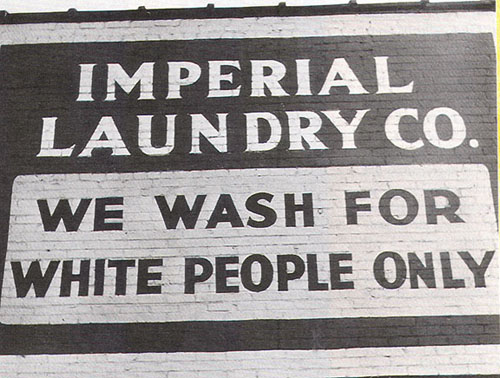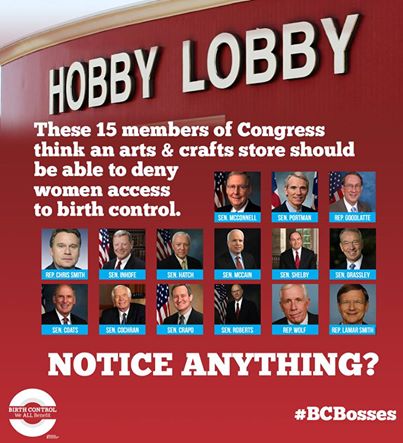How to discuss Hobby Lobby with business owners and people of faith
In a recent community forum conversation, someone posted the following in a discussion about taxing the wealthy. He was describing a friend of his who owned horses and the issues this business owner faced:
Why is this amazing?
First, someone turned a $240,000 profit off of a $20,000 investment after taxes and trainer fees. That’s a 1200% return on investment. Not bad.
Second, the person involved in this tremendous profit considers this “not a good deal.”
Third, because this comment has everything to do with the recent Hobby Lobby decision.
And fourth, because I consider the author of this post an ally, not an adversary.
Really quick, the background
On our local community forum, a truly brave soul posted a petition calling for a tax on the rich and the post infuriated several local conservatives who responded with their concerns.
One of the conservatives was an accountant who posted about the problems of small business owners.
He said:
When I owned my accounting firm, and people would ask me what I did for a living, I would tell them that I helped redistribute wealth.
In his opinion, the two problems facing small business owners are 1) finding people to work for them, and 2) taxes.
He posted the quote about his friend, the horse owner, as an example.
The moral value behind these statements
You might not think there’s a moral value other than profit behind these comments at all. But there is. It’s the moral of self-interest. It is the belief that the world is a difficult place and the only way people “learn” how to survive in this world is through self-discipline and restraint. It is the belief that people working in their own self-interest produce a greater good for everyone.
It is the belief in individual responsibility.
Someone reasoning from this value believes that individuals make choices and are rewarded or punished by the market for these choices and this is how you learn to survive in the world. The market is the moral authority and anyone who says differently is “interfering” with market forces.
Pure. Unadulterated. Individual. Everything is the responsibility of the individual and every result is because of an individual.
Part of this moral belief includes the idea that everything an individual earns should be that individual’s and the individual has no obligation other than to do with these earning what he or she wishes. There is no obligation to country, state, community, or anything else for that matter unless that individual wishes.
I point this out not because I agree with this value, but to simply highlight that someone expressing these beliefs is not “stupid” or “low information” or somehow otherwise misinformed. In fact, quite to the contrary, people who hold this belief often go to great intellectual lengths to justify their belief.
I point this out because the first step in winning anyone over is to identify the belief at the heart of the argument. If you don’t address things at the belief level, you’re having two completely different conversations.
What I believe
I believe in individuality as well but I also believe it is just one side of a coin called responsibility. The other side is mutual responsibility.
That is, I believe we need to be responsible to ourselves but I also believe we’re all in this together. I believe we have obligations to our community. I believe we are “our brothers’ keeper.”
Others have said this much better than me though. My favorite version is from one of the most important figures in Jewish history, Hillel the Elder:
If I am not for myself, who will be for me?
If I am only for myself, what am I?
And, if not now, when?
If we are only for ourselves, what are we?
We certainly aren’t a society.
Without mutual responsibility, we’re a bunch of people fighting each other endlessly or, to quote Thomas Hobbes, we “are in that condition which is called war; and such a war is of every man against every man.”
Why this matters to my online conversation
Because I also believe that the person who posted this believes in mutual responsibility and is not my enemy. Most people in our country hold this belief because it is the basis of Judeo-Christian religions.
My online friend has, however, chosen to forget mutual responsibility because he’s been told that selfishness will take care of everything and lead to a greater good. He has bought into a story that puts not just an emphasis on the “I” and the “me,” but puts all emphasis on the “I.”
This is the story of Ayn Rand and laissez-faire capitalism. In this Ayn Randian fundamentalist story, the market is god—it rewards the good and punishes the bad. In a Randian world, markets are judge, jury, and executioner.
Corporate special interest groups love Ayn Rand because Rand turns two beliefs into one. Ayn Rand turns mutual and personal responsibility into selfishness by claiming that pure, unadulterated selfishness leads to a greater good. In other words, acting selfishly is the only moral you need. The greater good part will sort itself out. Somehow.
Of course no one’s ever been able to demonstrate exactly how this greater good happens and all the science, history, and experience I’ve seen tells a different story. Everything I’ve seen says that people do best when we work together.
However, this appeal to the individual is compelling. You mean I don’t have to worry about anyone but myself? Thank God … err, market forces!
Back to my friend, however. I believe, as Hillel said thousands of years ago, that we need both to form a society. I also believe most people believe in both aspects of responsibility.
When someone argues from a belief in personal responsibility, this is a tremendous opportunity to expand the values discussion to include both in a manner very similar to Hillel.
Here’s how I responded to the poster:
I am sincerely sorry to hear about your friend with the horse, ——-. It is very sad to me that someone can’t see any good in making a $240,000 profit (1200% return on investment). This person must be very miserable indeed if he makes this kind of return and all he can see is that he pays 50% of this tremendous profit back to help maintain the country that made this tremendous profit for him possible. Your friend sounds like a tremendously selfish individual. Most people would gladly take a deal where they made $480,000 if they knew they only had to invest 50% back in the country that made such tremendous wealth possible.
My goal: win him over to a belief in mutual responsibility. Or, barring that, take the moral high ground away from him and win everyone else on the community thread over.
A few quick guidelines on how to accomplish this goal:
- No name calling.
- Remember that the person you are speaking with is a person and not a political pundit, even if the person repeats what political pundits say. This is a not an insignificant distinction. Corporate special interest group pundits are a valid enemy, people you know are typically not.
- Value your relationship with the person above winning any factual argument. Agree to disagree if you have to.
- Hold the moral high ground by speaking about your values (Here, mutual responsibility).
- Avoid the usual liberal/conservative back and forth.
What I am counting on is that most people have beliefs more like Hillel than Ayn Rand. That is, most people believe in both personal and mutual responsibility.
In other words, it’s easy to make his selfishness look immoral. Most people dream of making $240k selling a horse. This guy’s “friend” can’t see anything past his own greed. Even while making a 1200% return on investment, he feels he deserves more.
Kind of like this guy:
What happened with my friend?
He left the conversation. Probably because he knew he wasn’t going to be able to look righteous. Most everyone else on the thread sided with me. So I guess I was wrong in thinking him an ally. Still, I believe it’s worth considering everyone a potential ally until they tell you otherwise. And also to consider people who aren’t current allies as potential future allies.
NOTE: I never had to call him selfish (though I did point out the selfishness of his friend’s actions). Mostly, I just spoke about my beliefs and compared and contrasted them with Mr. Unhappy 1200%.
How this relates to Hobby Lobby
I believe this has everything to do with the recent Hobby Lobby decision and the GOPs evolving focus on “religious freedom.”
But not in the way you might think.
You know the argument. Religious freedom is being redefined to mean something different than it has traditionally meant.
Traditionally, religious freedom has been about the freedom to practice religion without fear of reprisal. Religious freedom is about the separation of church and state so that no single religion is able to become a state religion.
This new “religious freedom” is something completely different. It is much more closely related to the selfishness of Mr. Unhappy 1200% than it is to what we traditionally think of as religious freedom.
Glenn Beck describes it this way:
Anybody who says you want to talk about rights, you must stand for the person on both sides. This is, “I have a right to get a cake from a bakery,” not this specific bakery, but a bakery. Bakeries have a right to make cakes for homosexual couples getting married, period, and this particular bakery has a right to say, “I’m not gonna make it.” That’s how rights work.
It is the morality of the individual. “I” can do whatever “I” want if I simply believe it (and have enough money). Any harm to anyone else (from say discrimination) is never considered in the equation.
This new “religious freedom” is about finding a morality that allows anyone to do anything he or she wants, regardless of the harm or impact to anyone else.
Target and goal
This may sound obvious, but the GOP is targeting two groups with this approach: religions and business owners.
According to Pew Research, Christians in America comprise 78.4% of the target market. 51.3% Protestant, 23.9% Catholic to be more precise.
Business owners are being targeted for their influence. Very little happens in America without the support of business owners. According to recent research by Martin Gilens and Benjamin Page, interest groups and affluent Americans (the top 10% of income earners) have disproportionate influence on the direction of policy.
If you are a business owner, the message the Supreme Court has sent is, have we got a legal tax break loophole for you. Viewed this way, the Hobby Lobby decision is a pitch to business owners for their reciprocity and support.
Why this is important
Because you and Judeo-Christian religions are on the same side in this fight until you choose not to be.
Mutual responsibility is the fundamental value behind all Judeo-Christian religions. Not personal responsibility.
This means that if we can articulate a message of mutual responsibility, we win 78.4% of the target market. If we fail to articulate a message of mutual responsibility, we risk losing this market to a group that is twisting selfishness to target this market.
You and business owners are also on the same side until you choose not to be. Talk to anyone in business and they will be able to describe to you the idea of the “win-win.” This is another way to frame mutual responsibility. It is at the heart of good business practices. In a “win-win” transaction, both sides benefit. Often, this is because one side has a particular skill that the other side wishes to trade for using money gained from their own particular skill as a medium.
Mutual responsibility is a core value of businesses. If we fail to articulate a message of mutual responsibility, we lose the business owners who are being marketed to by the same group targeting them with a message of selfishness.
I believe we are about to lose these two groups on this issue.
Why?
Because everything I’ve seen so far says we haven’t been able to come up with a strategy that targets them.
We’re fighting the “war on women.” Or, we’re fighting religion. Or, we’re fighting conservatives.
I don’t mean the “war on women” in the false sense that GOP pundits use these terms. But in the sense that many of our responses are targeted towards women and the non-religious. In other words, we’re targeting a certain base constituency, largely the Democratic base. This is a good thing in terms of strengthening the Democratic core, fundraising, and hopefully getting out the vote.
I simply haven’t seen a strategy for talking to people who we don’t already agree with the Democratic base. I haven’t seen a good response that I can use to win over people who aren’t as involved in politics or consider themselves Independents. And many of the responses I’ve seen continue to play the divide-and-conquer game that favors corporate special interests and conservatives.
Here’s a few memes that illustrate some of the core arguments I’ve seen:
Arguments like the above are easy to portray as anti-business.
Arguments like the above divide the target market as women versus men. As women form much of the Democratic base, these types of arguments typically make good fundraising and “get out the vote” arguments to a core constituency. Arguments like these are needed. However, you’re unlikely to win over someone who isn’t already a part of the choir.
Why? Because there is a belief at the heart of the conservative argument that many religious people feel has nothing to do with women or men. In other words, when someone tells you that they don’t “hate” women, they really believe this. Of course, you may see things differently because you can see the effects some of these terrible decisions have on women. I take people (not pundits) at face value when they talk about their beliefs however. If I disagree with these beliefs, I’ve found it more effective to try to win them over to better beliefs. In other words, if someone tells me it’s not about women vs. men, I take them at their word and try to find out what it’s really about (in this case, naked individuality).
True. But not very powerful. Most people don’t find it hard to believe that the owners of a store can have religious beliefs. It’s a small step from here to the personal responsibility and individual freedom argument. That is, shouldn’t I be entitled to do what I want to do with my business?
What about Christians who hold the same values as I do? This over generalization puts all Christians on one side (hint: not ours).
This is a version of “conservatives are stupid people.” It’s funny, if you already hold the same beliefs as Jon Stewart. Offensive if you don’t. Either way, you’re not winning anyone over who doesn’t already believe the same thing you do. Don’t get me wrong, I like Jon Stewart tremendously and think he’s a great comedian. Political comedy however, by definition, rarely wins over anyone who doesn’t already have the same beliefs as you. If you didn’t have the same beliefs, you wouldn’t find Jon Stewart funny.
If you don’t believe me, watch a conservative comedian.
A quick note now before you get pissed at me because you think I’m somehow trying to shut someone down, let me state for the record that I’m not saying any of these memes are bad or without purpose.
I’m pointing out who the target is, what the intended purpose is, and arguing that these memes are unlikely to win over people who don’t already agree with you.
I also believe we’re hurting ourselves with a huge segment of the population who should be our natural allies based on their several thousand year history of mutual responsibility.
Many of these memes are expressions of anger. Rightly so. You should be angry. Anger helps to rally people who agree with you. Hell, I’m angry even now as I write this and I would never argue you shouldn’t be.
When you don’t want to be angry, however, is when you’re trying to win people over who may have bought into some different views.
How to win people over by talking about mutual responsibility
The memes mentioned above are great for fundraising, laughter, and firing up people who already hold similar views.
You are, however, unless you live in a bubble, quite likely to come up against opinions like the following:
I’m not sure what difference the blue pill makes to my position that birth control does not treat a disease but is a lifestyle choice – (excluding of course where birth control pills are prescribed for a disease). So why should I pay for your lifestyle choices?
I live in a very Catholic town so I come up against views like this all the time. It is another version of the personal responsibility argument.
It goes like this. It’s a woman’s choice whether she has sex or not. Because it’s her choice, I shouldn’t have to pay for it.
It would be very easy to get into a back and forth about choices I pay for that I’m not particularly fond of, but then I’m accepting her frame that individuality trumps law and simply quibbling about the details of who should pay for what.
First, what I like to do is establish some common ground. In this case, it’s easy because I believe in personal responsibility too. This helps break down barriers, establishes that we both care about values, and puts us on the same side:
I believe in personal responsibility too. I simply believe women and men are being responsible when they use birth control. They’re actively taking responsibility to avoid unwanted pregnancies. What could be more responsible?
Literally, get them to explain why they view something as “irresponsible.”
Compared to Europe, for example, the United States has one of the highest rates of unplanned pregnancies in the developed world. Largely, because we haven’t had universal coverage for birth control.
Lisa Bloom, writing about childbirth as a health care issue, says it quite eloquently:
All medically approved forms of birth control are far safer for women’s health than childbirth, as is abortion, a safe and simple medical procedure when performed by a doctor. Childbirth, in contrast, can be dangerous for poor American women. Most of us are unaware of the shocking fact that a U.S. woman’s chance of dying in childbirth is high and on the rise. We rank 60th in the world in maternal mortality rates, worse than China with its hundreds of millions of rural poor. Nearly eight hundred American moms died in childbirth in 2013, double the rate of Saudi Arabia and Canada, triple the rate of the U.K.
Or, to quote Supreme Court Justice Ruth Bader Ginsburg:
Contraception coverage enables women to avoid the health problems unintended pregnancies may visit on them and their children.
If there is any question about sex being a health issue, an even easier way to respond is: Why don’t we ask a doctor?
Inevitably, once the health benefits have been established, the argument that sex is a “choice” comes up again. To respond, all you have to do is talk about sex as something normal and natural:
Sex is a perfectly normal part of most people’s lives. Are you saying people shouldn’t have sex? What if they’re married?
When the topic of sex comes up, many people become uncomfortable. Especially if you talk about it as a perfectly natural thing instead of the taboo topic religions often skirt. The point here, once again however, is to hold the moral high ground. Don’t accuse. Don’t call anyone stupid. Just talk about what you believe and why. If people can’t handle honest, respectful conversation, that’s their problem, not yours.
You might think that “moral high ground” is an odd thing to say when talking about sex, but the choice it leaves someone is to acknowledge reality or to fall back on literal interpretations of the bible. (NOTE: If someone is a bible literalist, your odds of winning this person over likely decrease, but many, if not most, religious people aren’t literalists. They tend to see the bible as a framework of values for how to live their lives. And business people tend to be pretty practical.)
Then, the only thing left is, why should I have to pay for it?
The simplest answer is: you don’t. Insurance pays for it. We pay for insurance because we believe in mutual responsibility. With the passage of the Affordable Care Act, we believe in this principle as a country. This is why we formed a union. This is why we are a nation “of the people, by the people, and for the people”. In other words, it’s not just about you. You reap the benefits, you pay it forward.
Often, I will ask this question directly:
Do you believe we have a responsibility to others? To our country?
Jesus believed in mutual responsibility. He spoke with everyday people, healed them, empowered them, talked with them, expressed interest in their lives, and helped them gain self-respect.
Much of the New Testament, in fact, demonstrates Jesus’ concern for everyone (not just the wealthy) and the principles of mutual and personal responsibility we heard from Hillel. A few examples include the parable of the Good Samaritan (Luke 10:25–37), when he dined with Zacchaeus (Luke 19:1–10), and when he healed the centurion’s servant (Matthew 8:5–13).
Instead of complaining about what you have to pay from your $500,000 horse sale (or b*tching about having to pay for health insurance), maybe you should be thankful for your $240,000 profit and the fact that you live in a country where such wealth is possible. And maybe every once in a while you could think about the good that your tax money does.
In meme form, this might look like:
Sorry, I’m not the best at memes. Some of you out there can probably do better. Please share if you can create or have seen better.
Some other good thought questions to ask
- When it comes to health care services, should we let doctors decide or religions decide?
- Has anyone ever helped you before? How? What was your experience like?
- What part of your religion are you not allowed to practice? (If you don’t want to use birth control, you are perfectly free to not use it. What you are not free to do, however, is impose your religion on others.)
- What makes your religion better than other religions?
- If we’re going to give out special exemptions from the law, who should we give them to?
- Why are women and women alone typically held responsible for pregnancy? Shouldn’t the responsibility be 50/50?
Is this pandering to Christians?
I don’t pander to people. My first rule is to try to never say something that I don’t believe. This is actually much harder than it sounds. In this instance, we both believe in mutual responsibility.
You can’t “pander” to someone if you both genuinely believe the same thing.
I also have no interest in converting anyone away from their religion so I have no issue with God or anyone’s other beliefs.
I simply find most Christians natural allies on this issue because we both believe in mutual responsibility.
I feel similarly about business owners. Whenever business people talk about a “win-win” situation or conducting business in good faith, they are talking about mutual responsibility. You win when your customers win because they will do business again with you.
All I’m doing is explaining how we believe the same thing instead of creating or accentuating divides. When corporate special interests choose divide-and-conquer tactics such as the Hobby Lobby decision, they often have a reason. Rather than play into these tactics, a good way to win people over is to start with what you have in common.
Again, I’m not trying to say other approaches don’t serve a purpose (often to rally people who share similar views). I am suggesting, however, that if these are our only approaches we risk losing two huge groups who are our natural allies.
Cross posted at Daily Kos.


















